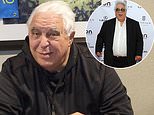What it’s like to quit your job and start teaching at 58: By LUCY KELLAWAY, who swapped her pampered life on the Financial Times for a tough east London school
- Lucy Kellaway, 58, worked for the Financial Times for 32 years as a columnist
- She realized two years ago that she was no longer enjoying her career
- She now works as a trainee maths teacher at Mossbourne Community Academy
- She is also the co-founder of Now Teach which helps others to become teachers
- Lucy shared the challenges and rewards of her new career
Usually I don’t make New Year’s resolutions, but for 2018 I have solemnly resolved to change ten things.
Among them: to tolerate no fiddling with rulers. To issue detentions to anyone who has not done their homework. To make corrections in green pen. To carry 18 glue sticks around in a transparent bag.
Until last September, I cared nothing for rulers. Nor detentions. I was a pampered columnist on the Financial Times where, for 32 years, I had led a happy working life writing about whatever took my fancy.
Now at 58, I am a trainee maths teacher at Mossbourne Community Academy, a strict comprehensive school in Hackney, East London. I am also the co-founder of a charity called Now Teach, set up to encourage other people with successful careers to join the world’s most noble profession: teaching.

Lucy Kellaway (pictured), 58, shared her experience of quitting her career as a columnist to become a teacher
My life has been turned upside down and inside out. What’s it like, people always ask. I wish there was an easier way of telling them that it’s all of this (usually at the same time): exhausting, invigorating, relentless, stretching, humiliating and deeply satisfying.
It started this time two years ago, when it occurred to me I no longer loved what I was doing. My columns weren’t getting better, possibly worse; my youngest child had left home for university; my father, who I’d been caring for, had recently died and my mortgage was paid off.
I was nearing the age when a previous generation would have been sloping towards retirement. But why would I want to do that? Dad had lived until he was 90; it’s probable I’ll live longer still. I expect to be working well into my 70s.
For this last career, there were two things I wanted: the excitement and fear of starting all over again, and the feeling of being useful. As my mother was a much-loved English teacher and my daughter is an inspiring teacher of history, useful could mean only one thing for me: following them.
So NOW, as I start a new term, and with my first (and possibly hardest) term behind me, how is it going?
The sobering truth is that, if what I wanted was fear and excitement, I have got it in almost unmanageable quantity. So much so that most mornings I am wide awake at 5am, my head so full of lesson plans and children’s faces I can’t remain asleep.
As for feeling useful? Not yet. Though towards the end of last term a child who had been steadfast in their refusal to see that subtracting a negative number was the same as adding a positive one, suddenly got it.
In 35 years in the workplace, I don’t think I have experienced such a professional high as when I saw the student’s page of correct sums.

Lucy co-founded Now Teach to help people of all ages begin a career in teaching
Back in the spring of 2016, as I was plotting my escape from journalism, it occurred to me that instead of being unusual, I was surely typical for a fiftysomething professional.
It is normal to feel restless after a couple of decades of doing the same thing. It is normal to want to do a job that means something.
Every time I opened a paper, I read about the growing shortage of teachers, especially in science, and while there is nothing to stop someone my age becoming a teacher, all the recruitment material showed smiling pictures of 22-year-olds.
If there is Teach First, the organisation that recruits raw graduates to work in schools, where is Teach Last?
So, on a hunch, I co-founded Now Teach, did a bit of publicity and sat back to see what happened. Nothing prepared me for the flood of applications.
Within 24 hours of writing about my plans, 20,000 people visited the Now Teach website and more than 100 applications arrived.
In total, 1,000 people of a certain age expressed an interest and in September, 47 of us cast off our old lives and started again, learning on the job in classrooms in challenging secondary schools in London.
At our assessment centre, qualified trainers grilled us on subject knowledge tests. We gave lessons we had prepared, before being interviewed by the schools we’d been matched with.
Now we work four days a week, spending three-and-a-half days in school and a half-day in training, which is provided by various teacher training bodies including Ark, the educational charity.
Buoyed by success, this year we are recruiting twice as many adults in schools in London and Hastings.
And just this past fortnight, Teach First revealed it was shifting its focus to older trainees, encouraging more middle-aged professionals to change careers to improve schools.

Lucy works as a trainee maths teacher at Mossbourne Community Academy (pictured) earning about £20,000
When we launched, various people accused me of doing something immoral. I had no idea about what it was really like working as a teacher, and yet there I was, in my ignorance persuading others to join one of the toughest professions in the world without knowing a thing about it.
Now a term in, I admit it was an act of hubris on my part, but I’m not remotely repentant. Just before Christmas, the first Now Teach cohort gathered for a drink to celebrate surviving our first term. Everyone looked thinner, a bit tougher, but also — oddly — younger.
Maybe it’s about being surrounded by the young. Or maybe it’s what happens to you when you start learning all over again.
With lukewarm prosecco and a slice of pizza, we toasted surviving the first term and talked until closing time about the kids in school, behaviour, planning.
Only three of the 47 so far have not made it, and even if a few more fall by the wayside, the others are bringing to schools an experience of the world and true dedication.
As we shared stories of assorted humiliations and triumphs, we were agreed on one thing: teaching is brutal. Even if you are in schools where behaviour is excellent and where there is no chance of a child throwing a paper aeroplane, let alone a chair at you, it is still hard. Possibly the hardest thing we’ve ever done.
It’s not that the hours are long — they are no longer than many other professional jobs.
It’s not even that as a teacher you lose all the autonomy you used to have in your old life.
Former colleagues and contacts frequently say to me: ‘Let’s have lunch. Which day is best for you?’ They struggle to understand my answer: ‘Teachers don’t do lunch.’

Lucy says the best and hardest thing about being a teacher is 'the teaching itself'
At best you have a polystyrene box of shepherd’s pie and cake and custard at your desk while you finish your marking.
I don’t mind that structure. I rather like the comforting way my days are ruled by bells just as the children’s are. I don’t mind being junior, either. I relish it. I used to have a fancy title that commanded respect. But there is a simplicity to being at the bottom of the pile. I am responsible for only my own learning.
As a trainee teacher I’m on about £20,000, so I’m dipping into savings, but not as much as I’d expected as I’m hardly spending any money — I have no time for shopping.
The problem isn’t my age either. I haven’t felt for one second that I don’t have the energy for my new vocation. It’s tiring for everyone, but the people who seem worst affected by it are not the fiftysomethings, it’s the teachers who have young children at home.
If the kids think it is extraordinary to be taught by someone with grey hair, they don’t say so. With my young colleagues age is also irrelevant. We all happily work and joke together, so much so that I started to tell myself they didn’t even notice I was three decades older than them.
That is until one of them brought me back down to earth by saying I reminded her of her grandmother.
The thing that is hardest, is also the thing that’s the best: the teaching itself.

Lucy claims she needs to improve her ability to see what each child is doing, as she believes the best teachers know when to explain themselves and when to let the children work
I used to be rather good at my job, but now I am at best OK, and at worst dismal. Teaching turns out to be a difficult, highly skilled job, and I’m naturally feeble because I’m a novice. If I were a trainee heart surgeon, I’d be pretty ropey after my first term, too.
I suppose I expected that because teaching runs in the family, I would be a natural. I had visited too many schools to be expecting to experience the real-life equivalent of Dead Poets Society — the film where Robin Williams’s teaching is so inspirational that it quickly transforms his students’ lives — but privately I expected to be good right away.
The truth is I’m not. In every lesson I make scores of mistakes, only in teacher training they aren’t called that. They are euphemistically called ‘even better ifs’ (EBIs). My EBIs are legion. I need to learn not to talk until I have 100 per cent attention and no one is fiddling with rulers. I need to talk less altogether.
I need to do something about chaotic beginnings and endings to lessons, where I have forgotten to hand out the homework sheets and failed to bring the glue sticks. I need to do less of the heavy lifting and get the children to do more of it.
I need to master the electronic whiteboard, which still defeats me. (In each of my first four lessons I amused the children by writing on it with a felt pen, rather than the electronic one.)
More fundamentally, I need to be better at seeing what every child is up to, who is listening, who understands and who doesn’t. The best teachers know when to explain themselves and when to let the children work.
My mentor, Mariam Rizvi, is a formidable maths teacher 25 years my junior who is as demanding of me as she is of her students.
Do I mind being told what to do by someone who is barely older than my children? Not at all. Age is irrelevant. I respect her experience so I do as she says.
She sits in on my classes and will send me emails that tell me in no uncertain terms just how many things I am getting wrong.
I don’t take them amiss. I’m finding that being a novice is easier now than last time I was a novice some 35 years ago. When I am handed a list at the end of a lesson of all the things I’ve done wrong, I sigh inwardly, but then set about trying to put them right.
I’m not sure where this new thick skin comes from. As a columnist, I would smart for ages if anyone presumed to hint my work was wanting in any way. Possibly I’ve grown-up, but I doubt it. I think it is something more fundamental.
Being a columnist was about me. Being a teacher is not about me. It’s about the children.
And this is what saved me on the darkest days at the end of last term, when I had forgotten to turn up for the detentions I had set myself, and failed to grasp that my explanation of substitution in algebra had gone straight over the heads of half the students.
On those days I think about the kids. On my mantelpiece at home I have a card from a student saying: ‘You are the best maths teacher I’ve ever had.’ I’m sure some students butter up all their teachers in that way, but still I treasure it.
I know I have a long way to go. But even now, after a day of teaching, children mostly come away from lessons knowing something they did not know at the start. And it feels wonderful.
I am writing this on the last day of the holidays, and the prospect of tomorrow fills me with even more excitement and dread than I felt on my first day back in September.
This time, unlike last time, I know exactly what I’m letting myself in for.
I don’t know what will happen to me in 2018. But I do know two things. First, I will not be bored for one moment. Second, I know that however hard I continue to find it, I will be on my way to being useful.
And for that reason, for the first time in my life, I am going to keep my New Year’s resolutions.
nowteach.org.uk
Most watched News videos
- Scottish woman has temper tantrum at Nashville airport
- Tesla Cybertruck explodes in front of Trump hotel in Las Vegas
- Mass panic as New Orleans attacker flies down Bourbon street
- Shocking moment zookeeper is fatally mauled by lions in private zoo
- Horrific video shows aftermath of New Orleans truck 'attack'
- Meghan Markle celebrates new year in first Instagram video
- Tesla Cybertruck burns outside Trump hotel in Las Vegas
- See how truck that drove into crowd made it through police barrier
- Cheerful Melania Trump bops to YMCA at Mar-a-Lago NYE bash
- New Orleans terror attack suspect reveals background in video
- Plane passenger throws drink at flight attendant in boozy fight
- Horrifying moment yacht crashes into rocks and sinks off Mexico coast































































































































































































































































































































































